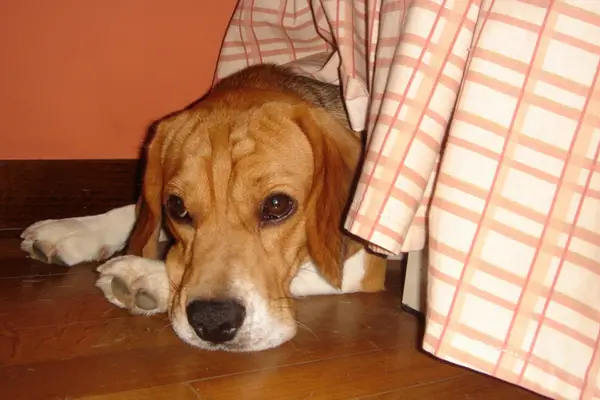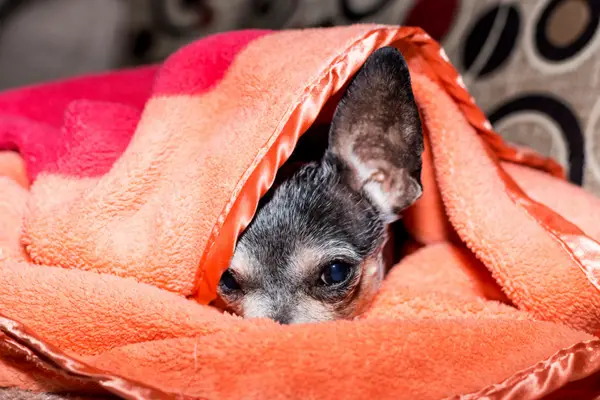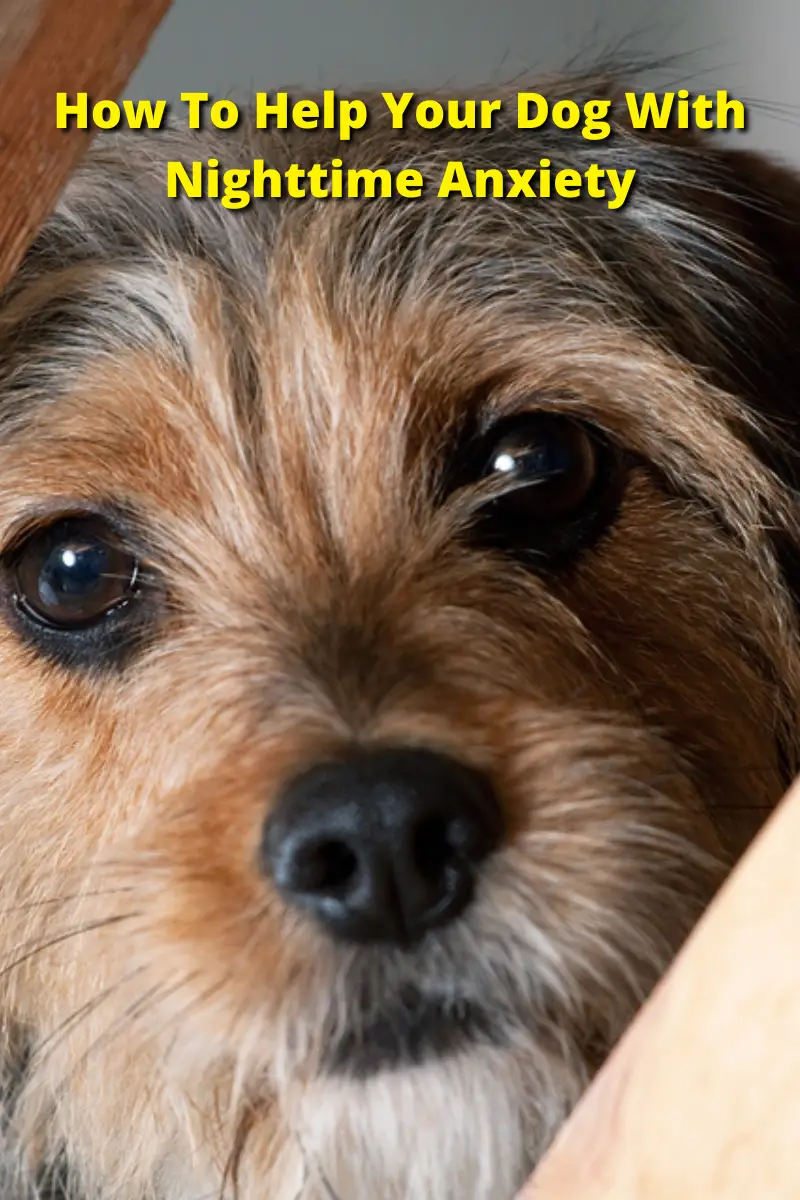It’s late at night, and your dog wouldn’t stop barking, crying, or howling. He has been busy scratching your bedroom door, trying to get in. This can be very frustrating because it could wake you up at night. It can also begin to frustrate your neighbors.
However, what you may think of as just simple bad behavior, is already what we call night separation anxiety. But how do you help a dog with separation anxiety at night?
Below, we share what separation anxiety is, what symptoms to watch out for, what causes it, and, most importantly, how should you help your dog that experiences it.
What Is Night Separation Anxiety?
The goal of this article is to answer “How do you help a dog with separation anxiety at night?” Separation anxiety is something your dog usually experiences whenever there are changes in the household or if he’s left alone. Although your dog may experience this during the day when you’re away, some dogs experience what we call night separation anxiety.
Like separation anxiety, night separation anxiety is triggered by big changes like you not being by his side as well as the darkness that comes with the night.

Symptoms of Night Separation Anxiety
If you’re wondering “How do you help a dog with separation anxiety at night?”, know that dogs show separation anxiety at night in different ways. Here are some of the ways your dog shows you that they’re stressed:
Trying to Get In Your Room
The most obvious sign your dog is distressed is when they try to enter your room. He will scratch your door or floor (like digging) in attempts to come in. This is one of their ways to show that he needs to be with you and that he would want to sleep near you.
Whining or Panting
Another way your dog will show he’s stressed is when he starts whining or panting. Worse, your dog may even start to bark or howl, which will not only disrupt your sleep but may affect your neighbor’s sleep as well.
Pacing Through the House
Another way your dog shows you he’s stressed is when they start pacing. Your dog would either pace throughout the whole house, back and forth in one place, or even in circles. This can be very bothersome to watch, but your dog might do this the whole night if they don’t calm down.
Urinating or Defecating
How do you help a dog with separation anxiety at night, especially if they are urinating or defecating in the house? If your dog is housetrained and starts doing this, it can already be a symptom of separation anxiety. However, some dogs do this due to medical conditions, so it’s still best to visit the vet to ensure this behavior is related to some night problems and not health complications.
Destructive Behaviors
Next, you might also wake up to a house full of mess. Your dog will try to chew or bite any household item they see. Your dog may also try to chew on windowsills, scratch the furniture, or get into the trash can. Your dog is capable of a lot of destructive behavior, so you should address the issue immediately once you observe this.
Biting Tail
How do you help a dog with separation anxiety at night if they are biting its tail? One thing that you don’t want to happen to your dog is when they start hurting itself. This means scratching their face or biting their tail. If this happens, you need to take your dog to the vet.

Related article: Best Dog Toys for Separation Anxiety
How Do You Help A Dog With Separation Anxiety At Night? Some Of The Causes:
You might be wondering how your dog would experience this at night because you’re home. Well, several situations will trigger your dog’s separation anxiety at night:
Being Separated From You
The number one cause of night separation anxiety or just separation anxiety, in general, is when your dog gets separated from you regardless if it’s abrupt or not.
Think about it; if we get a puppy, we usually allow them to sleep with us at night. However, as they grow bigger (especially if you get the bigger breeds), they may no longer fit in your bed. So you have to provide them with their beds and let them sleep outside your room.
However, most of the time, this change of not sleeping with you can trigger separation anxiety. Your dog will not immediately understand why they need to be separated from you. He already grew dependent on you and being alone can be really scary.
Aging
Another thing to be aware of when you ask yourself “How do you help a dog with separation anxiety at night?” is to understand that the cause of separation anxiety may be due to aging. As your dog grows older, he may experience some psychological changes. His vision may start to become blurry, and his hearing may not be as sharp as before. This change can gravely affect your dog’s sleep, which causes anxiety and stress.
Lack of Activity
We always say that a tired dog is a calm dog. Exercising your dog during the day will significantly help him get better sleep at night. How do you help a dog with separation anxiety at night if they are not tired?
Give your dog time to exercise during the time. He should be able to exhaust as much energy as he can. If your dog will not be able to do this, he may become restless, and he will find it hard to get some sleep at night because he wasn’t able to expel all that energy.
Changes in the Schedule
Changes in your dog’s schedule can also trigger separation anxiety. For example, if your dog is used to being exercised, and if you suddenly stopped letting them run around throughout the day, he will not be able to sleep. Another example is you always play with him before bed, but suddenly you didn’t do that, and you just went to sleep.
You see, dogs can be very particular about these tiny details. It’s already something that they’re expecting to happen and even the smallest changes are very troublesome.
Moving to a New Home
Any type of change can trigger separation anxiety, including moving to a new home.
You might have experienced this, too. You visit a new place; it’s a new environment, a new view, a new scene, etc. Everything is just so different that you feel so uncomfortable you can’t really sleep the first day.
This is almost similar to what your dog would feel when you move to a new home. Their favorite spot or view may no longer be there, and this makes them so uncomfortable. He is no longer familiar with the house because everything is different.
So, if you need to move to a new place, you must bring along something your dog loves. This way, there is always something your dog is familiar with.
Losing Someone or Another Pet He Loves
Humans aren’t the only species that grieve when someone they love is gone. Dogs do that, too.
Again, dogs react to any particular changes regardless if it’s changes in the routine, environment, or the persons around them. If someone very close to him is gone, he will feel sad about himself, making it hard for him to sleep at night.

Calming Bedtime Routines You Can Follow
How do you help a dog with separation anxiety at night with calming bedtime routines? Below are some bedtime routines you can follow to help your dog get some good night’s sleep:
Exercise
The very first thing you should do is let your dog get some exercise. As mentioned earlier, a tired dog is usually calm, so you need to find a way to help your dog spend all of his energy during the day.
At the same time, exercise undeniably offers more benefits to your dog’s overall health, so it’s important to take this activity seriously.
Give Them a Treat
Treats are something dogs always love! Your dog getting one before bedtime will give him something to look forward to. It’s also a great way to help your dog calm down during bedtime if they want to get their treat. If this becomes a routine, your dog will start associating the treat as a signal for him to sleep.
Related article: How Do You Help A Dog With Separation Anxiety?
Provide Them A Comfy Place To Sleep
An exercise and a treat won’t give your dog a relaxing sleep if he doesn’t have a comfy spot. Dogs and most pets, in general, usually choose one spot to sleep in every night.
Try to find where this is and make it comfier and cozier for your furry friend. Your dog should be able to lie down comfortably on the bed. It should be soft, and clean, and doesn’t give off a strong scent so your dog can sleep peacefully at night.
Give Them A Toy
Another way to answer “How do you help a dog with separation anxiety at night?” is to give your pup a toy! Just like with children, some dogs love having a toy with them in bed. It’s like your substitute. Something that makes them feel that they’re not alone.
As much as possible, this toy shouldn’t be the interactive kind that gives off a sound or something he can tug. You can opt for plushies that are soft and cuddly that are really perfect for bedtime.
Get Some Calming Scents
You can also spread some perfume of calming essential oils on your dog’s bed to help him become more relaxed. It helps eliminate any kind of anxiety your dog is feeling so he can have a better sleep.
Spend Some Time With Them
Finally, make sure to bond your dog before bed. This is different from playtime. It’s like a quiet time that you usually do for a little baby to help them doze off. Try to pet your dog to remind him how good he is the whole day and that he should just sleep tight.
Other Things You Can Do To Treat Separation Anxiety
Creating a bedtime routine will help your dog sleep well at night. But, there are more things outside that would greatly help with your dog’s night separation anxiety:
Don’t React Every Time Your Dog Frets
To be with you, your dog will whine and try to get your attention every time. If this happens, don’t react. Leave him be until he calms down. This will help your dog feel that you won’t do what he wants, even if he whimpers. At the same time, this can help your dog become more independent.
Distance Training
Next, don’t let your dog get used to being with you all the time.
If you wish to no longer sleep with your dog, the best thing you can do is do distance training. This means giving your dog a chance to be alone for a few minutes in a room. If your dog frets, don’t go inside the room immediately. Instead, wait for him to calm down.
You can also just start with a few seconds and then come back immediately even if your dog doesn’t stop crying. However, it’s important not to act as if you missed him so much already as it will let him think that you don’t want to be away from him, too.
Do this at least once a day and by increasing the time gradually.
Don’t Make Going To Bed a Big Deal
You should also make sure not to make going to bed a big deal. Don’t hug your dog so much like you’re going to miss him even if you’re only going to your room. This will only trigger fear, which will cause your dog’s anxiety.
Stick To Playtime and Routines
If your dog has a routine he’s following, like the one above, stick with it. Remember, any changes can trigger your dog’s anxiety, and that includes changes in his schedule.
Calming Aids
Lastly, you can take your dog to a vet and probably get prescribed calming aids. Providing calming aids will help in the first few weeks while you’re still letting your dog fight off separation anxiety. However, it’s not recommended to rely on this.

Conclusion
We hope we answered “How do you help a dog with separation anxiety at night?” for you! Night separation anxiety can be a very big deal if it’s not taken care of immediately. Lack of sleep can significantly affect your dog’s health, and your relationship with your neighbors can also get affected if your dog continues to make noise.
The routine we showed above will greatly help with this problem. But, since every dog is different, you can also create your dog’s bedtime routine.

